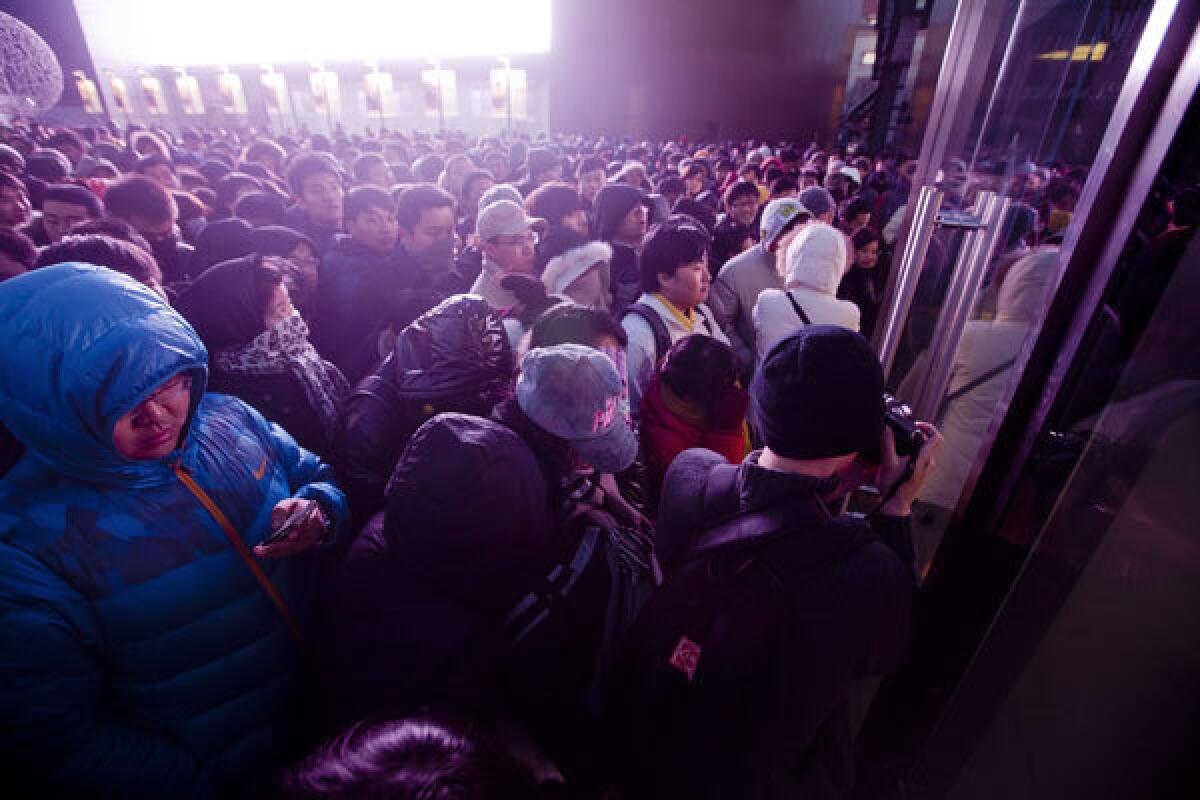Apple fans in China disappointed: No iPhone 6 for now

Over the years, Apple has faced a variety of challenges in bringing its products to Chinese consumers. For its soon-to-be-released iPhone 6, the company may be running up against the Chinese government’s determination to push forward the nation’s homegrown 4G standard.
Apple disappointed millions of Chinese fans this week when it said that its latest iPhone would not go on sale in mainland China on Sept. 19, the date it is to hit stores in the U.S. and nine other territories.
The Cupertino, Calif., company has not said when the new phone will be available on the mainland. When Apple released the iPhone 5s last year, the device went on sale in China at the same time as in the rest of the world. So the situation with the iPhone 6 has led to rampant speculation in the Chinese press.
One of the most popular theories: Apple got caught up in the Chinese government’s plan to build a 4G network dominated by the indigenous TD LTE standard. Most of the rest of the world’s 4G networks run on a standard called FDD LTE, which is widely supported by smartphone makers.
China’s telecommunications regulator has not granted Apple a permit that would allow the iPhone 6 to be sold in China.
“The Chinese government looks to be holding the iPhone 6 hostage to teach China Unicom and China Telecom a lesson and forcing them to grow their TD LTE-based networks before favoring the FDD LTE standard,” said Zhang Yuhong, who writes for Beijing based technology publication 36kr.com.
Apple’s representative in Beijing declined to comment on whether the 4G standard was an issue.
China Mobile, the nation’s largest mobile carrier, looks set to dominate the 4G market with the TD LTE-based network. Smaller players like China Unicom and China Telecom are betting on the international FDD LTE standard for their 4G networks, although they have been forced by Chinese authorities to establish a sizable TD LTE-based network first. Building an FDD LTE-based 4G network allows those smaller carriers to offer a larger selection of smartphones that support this international standard, as the number of devices supporting the Chinese TD LTE standard is still limited.
Apple faced a similar situation before in China. When 3G was being introduced, Apple was initially forced to partner with smaller carriers like China Unicom and China Telecom because its smartphones didn’t support the TD SCDMA standard that runs on the network of China Mobile. Because of that, Apple missed out on a large number of potential buyers who did not want to switch carriers just to get the iPhone.
In January, Apple signed a deal with China Mobile and began selling iPhones that can be connected to the carrier’s 3G network.
China is now constructing a 4G network. China Mobile, China Unicom and China Telecom have all received licenses to build 4G networks based on the national TD LTE standard. But China Unicom and China Telecom are also expected at some point to receive licenses to use the FDD LTE standard.
Chinese authorities may want to avoid a repeat of the embarrassing situation surrounding its homegrown TD SCDMA standard for 3G networks. Because that standard was only deployed by China Mobile and very few devices supported it, it eventually delayed the development of China’s 3G networks.
Some observers say Chinese authorities want to make sure the homegrown TD LTE standard can dominate the country’s 4G networks before allowing a foreign-developed 4G standard in.
Last week, a document that purported to be a leaked internal directive from the Ministry of Industry and Information Technology, which oversees the country’s telecommunication industry, surfaced on Chinese social media websites. It said that all smartphones sold in China would be required to lock out the FDD LTE functionality.
That seems to raise the question of whether Apple would be willing to comply with such restrictions on its crown jewel. Chief Executive Tim Cook said during Tuesday’s keynote that the device would support more than 200 carriers globally, including China Mobile.
“It’s possible that Apple is willing to wait until the iPhone can be released in China without any restrictions on its FDD LTE network support,” said Xu Hao, who monitors China’s smartphone market for Beijing based consulting firm Analysys International.
Cook has called China “one of the most important markets” and when Apple announced its latest quarterly earnings in July, revenues from greater China, including Hong Kong and Taiwan, were up by 28% from a year earlier, largely outperforming the company’s overall year-over-year growth rate of 6%.
Xu suggested that the delay of iPhone 6’s launch in China may not have a major effect on Chinese consumers, who can easily purchase the device through online vendors who bring in iPhones from overseas. “Tim Cook has always sounded very confident about the Chinese market. He may not mind diverting some of the sales numbers from China to regions where the growth of iPhone sales looked flat in recent months,” he said.
China’s largest e-commerce website, Taobao.com, posted a link on its homepage Wednesday, offering shoppers different options to buy the latest iPhone through vendors based in Hong Kong, the U.S. or other countries in the Asia-Pacific region.
Chinese consumers have also called on the Chinese government to not restrict Apple’s latest smartphone. “Please do not give me a castrated iPhone 6!” was one of the most liked comments on Chinese social media website Weibo this week.
Tommy Yang in the Times’ Beijing Bureau contributed to this report.






